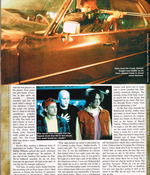The Law In Roswell
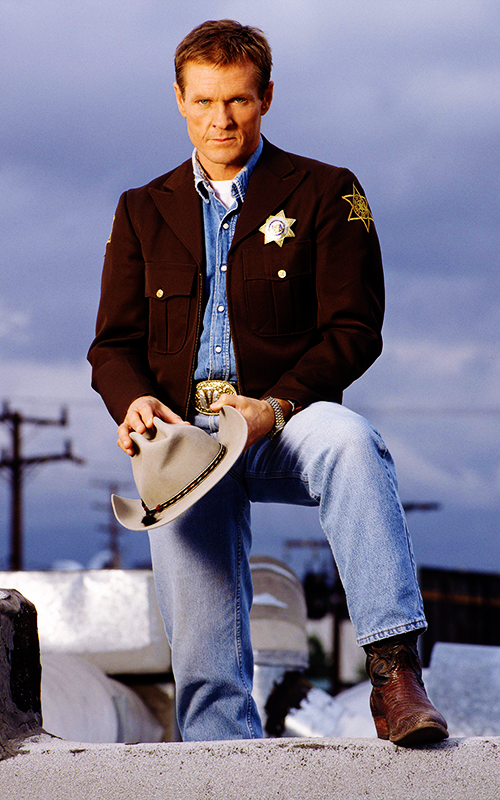
Great American character actor William Sadler has found a home in the science fiction universe.
When he was a little kid growing up in Orchard Park, New York, William Sadler lived on a farm and played regularly with a boy who lived down the road. That boy had a chicken coop, and he and Sadler would take the lids off mayonnaise jars, draw numbers on them and then nail the lids to the coop wall.
You’re getting the idea, right?
“My friend and I would sit on the dirt floor and play with the lids, because they were the dials on our spaceship,” Sadler recalls fondly. “We would look out the chicken coop window and play Star Trek. We were Spock and Kirk, and we would trade off playing the characters. It went on for hours and hours and hours. Every time we stepped out of the chicken coop, we were on a different planet. In a way, I feel like I’ve been rehearsing for all the genre projects I’ve done since I was about eight years old. So, it really doesn’t surprise me that I’m so comfortable in the genre.”
Lawful Nemesis
These days, Sadler is one of the most familiar faces on the genre scene, with an insanely long list of SF and horror credits that includes Project X, Bill & Ted’s Bogus Journey, Freaked, Demon Knight, Bordello of Blood, Solo, Rocket Man, Disturbing Behavior and The Green Mile, all on the big screen, and episodes of Tales from the Crypt, The Outer Limits (“Valerie 23”), Poltergeist: The Legacy (“Fifth Sepulcher”, the series pilot) and Star Trek: Deep Space Nine. At this moment, he’s sitting in a golf cart just outside the door of the soundstage where his latest SF gig, the popular WB series Roswell, is filmed. Roswell co-stars Sadler as Sheriff Valenti, who’s hot on the trail of the show’s alien trio — Max (Jason Behr), Isabel (Katherine Heigl) and Michael (Brendan Fehr).
There’s no denying that Valenti is the villain of the piece, but he’s not strictly a black-hat baddie. He’s more of a de facto villain. “From the pilot, he was given a reason to be so driven to find the truth, the reason being this his father was drummed out of the police department and made the laughing stock of the town because he believed, ” Sadler notes. “Now, all these years later, I’m confronted with the same evidence my father saw. So there’s this sense of, ‘Oh my God, what if this was true?’
“As an actor, that’s great stuff, very human stuff, to play. If he ever gets his hands on these kids, they’re in trouble. He won’t know what to do with them. But his reasons for wanting them are very human. And the fact he has a teenage son [Nick Wechsler as Kyle], who he has trouble with, makes him more human too. They don’t communicate very well and that’s very real. We’ve done an episode [“Into The Woods”] in which Kyle makes me confront the fact that there’s something else in my life that’s as important or more important to me than my own son. At the episode’s en, I go to see my own father because I’ve realized what I’ve been doing all this time.
“So Valenti is the villain, but what makes him a fun villain is that he’s not cartoonish. He’s not Mr. Freeze in Batman. He has very real problems. He has a irl friend. He flirts with the ladies in town. He’s dealing, as I said with a teenage son. But when he’s chasing the aliens, he is a very real threat to them. For whatever reason, he’s after them. He’s really after them. That’s just a function of his character,” Sadler continues. “he has to keep the heat on them. They can’t ever relax. It’s like The Fugitive in that way, with Inspector Gerard. If Gerard is ever not chasing Kimble, we can all relax, but then you wouldn’t have a show. If there isn’t the danger that Kimble will be found, what’s the point? It’s the same thing, pretty mush, with Valenti and the aliens.”
Sadler has worked on the stage in film and on TV for more than two decades. He has enjoyed long runs on Broadway, with his Biloxi Blues stint lasting a year-and-a-half. He has also played recurring roles on TV, notably Sloan on DS9. Roswell, however, represents his first assignment as a series regular on a weekly TV show. It is, he explains, a unique challenge. “You don’t’ have the luxury of the time that you would put into film, where you know a month ahead of time that you’ll be doing these particular scenes, in this story, with these actors,” he says. “On a film, you can start digging and thinking about character background. You can ask all the millions of questions you ask yourself. We star shooting an episode on Wednesday, and I saw the script for the first time on Monday. So, there’s a lot of thinking on your feet that happens on a weekly show.
“You have to make quick decisions. There’s no rehearsal. You fall back on your instincts and your bag of acting tools that you bring with you. At the same time, it’s great fun that everything changes so quickly. Valenti is basically the same man week to week, but the situations keep changing. I like getting to see the character evolve. In all my years as a film actor, I never got to have a girl friend. My tasks were different. I never had a teenage son to deal with. So, there are challenges to doing something like Roswell on a weekly bases, but I’m being called upon to explore lots of new places as an actor. Let’s put it this way: Colonel Stuart from Die Hard 2, who was also a very driven man, never had any of these things to consider or worry about. He didn’t have these other colors to him, the way Valenti does.”
Alien Pursuits
Like everyone associated with Roswell, Sadler was astonished by the reception afforded the show upon its debut. The ratings were stellar and the reviews were glowing. “I don’t know if I should have been astonished,” Sadler admits. “I’ve done a number of pilots, but I never had one that was as widely well-received. Critics who don’t like anything liked the pilot. And the response since the pilot has been very good, too. At the beginning, it was really the critics who weighed in, and now it’s more one-to-one. People in stores come up to me and say, ‘Hey, I saw the show last week. It was great.’ That’s nice to hear.”
So what’s working best in Sadler’s view?
“I think the humor is one of the things that works the best, when it’s there,” he replies. “The show doesn’t take itself too seriously. It’s a delicate balance, to build suspense, to have something at stake, while at the same time letting the characters laugh at their own human-ness adn the ironies of the situation. I would like to see more of the humorous sides of these characters come out. I also love the directing. Every once in a while we get a director — David Nutter is one; Jonathan Frakes is another — who just has a great instinct about moving that camera. They’re in and out of cars, actors the lawn and through the front door and up the stairs. It goes by like a freight train. It’s great to watch, as an audience member. It has a great energy that static shows just don’t have. Also, when a show that David or Jonathan does direct actually grinds to a halt, it’s for a real reason. Everyone goes, ‘Oh shit. Wow,’ and they pay even more attention to what’s going on.”
On the set, the 40-something Sadler is among the oldest actors. As a result, he feels simultaneously ancient and recharged by being surrounded by so young a cast. That was especially the case early on. “At first, it was very apparent to me that I was quite a bit older than everybody else on the show, the rest of the regulars, at least,” he comments. “it was great fun because of that. I always felt that they sort of looked up to me or respected me, which was very nice. Now, I blend in. I don’t go out dancing with the rest of the cast, but when it comes to the work, the age difference never comes up. We’re all here for the same task.
“And I really like the cast. Most of my scenes so far have been with Nick, who is an extraordinary actor. He’s very gifted and, but the way, very funny. He has a dry, twisted sense of humor that you don’t’ see right away when you meet him. they’re all good. One of the things that Nutter did in the show’s casting was that he saw to it that each and every one of those roles was case with someone who — more than looking right, more than having the right credits or the right TV-Q — could act. If people are buying the performances, buying the story, we can take them anywhere. Jason and Shiri Appleby are superb, too. They’re all very good at what they do.”
Sadler serves up additional words of praise for executive producer and frequent director Nutter, from whom he first took direction on the ill-fated fear feature Disturbing Behavior he and Nutter came to trust one another. “We got to a point where he knew that I knew my character, this janitor, and that what I was going to be bringing to the scenes would be good. We knew it might not all work, that it might not end up all in the film, but he could trust that it all came from the right place and htat it was coming for the right reasons,” Sadler says. “Once that trust was established, the working relationship became fabulous. I felt a freedom to go as far as I wanted to go, knowing that he would edit me either on the set, or after choosing from takes, in the editing room.
“To some degree, that was carried over to Roswell. That’s one of the main reasons why I did the series, to work with David again and, hopefully, to recapture that working relationship. That does not happen all the time. A director’s insecurities and his need to control a set, control his vision, often makes him hold onto things with an iron grip. Every once in a while, though, you run across a director who sees in a character what you see, and the director then relaxes and lets you do your job. David is one of those directors.”
What happens to Disturbing Behavior, however still disturbs the actor and Nutter was well: “David was just so upset, so upset. He put his heart into that movie. I’ve seen directors watch their stuff get edited down before. That happens all the time. But it was so severe in David’s case. I didn’t like what got cut out of Disturbing Behavior, like any romance, any humanity, any back story. You’ve got the kids, the SF and people getting drills in their eyeballs. If it wasn’t that, [the studio felt] the audience didn’t need to see that.
Genre Chasers
Sadler takes a big gulp from a cup of coffee and begins to offer a few thought about and memories of his previous genre credits.
Of Project X, he says, “Helen Hunt was great. I loved working with and Matthew Broderick, who had been in Biloxi Blues with me. The film scared me to death. I had had no experience in Hollywood before that, no experience to speak of acting in front of cameras. Pretty much everything up until then had been stage, where you had tremendous freedom. I didn’t understand the craft of the camera. I didn’t know the difference between playing a close-up and a wide shot. I took me a while to learn and, fortunately, I had directors like [Project X‘s] Jonathan Kaplan, who were very patient with me.”
Sadler took up the scythe as the Grim Reaper for Bill & Ted’s Bogus Journey. “That was a blast!” he exclaims. “It was just a flat-out fun to take such a silly character as far as I wanted to take him…and then some. I had a ball. Bill & Ted led to Freaked. I did that because [Bill & Ted co-star and Freaked co-director] Alex Winter asked me to do it. I don’t remember much about the film, but it’s remarkable how one project leads to another.”
Similarly, the TV terrors of Tales from the Crypt spawned other roles for Sadler. “I did the first episode, ‘The Man Who Was Death, which Walter Hill directed. That led straight to Die Hard 2, because Joel Silver was one of the produces of both Crypt and Die Hard 2. Crypt also led to Trespass, which Walter did, and to Demon Knight, which was Joel again. It led to Shawshank Redemption, because Frank Darabont was one of the writers on Tales from the Crypt. He came up to me on the set and said, ‘I’m going to do this,’ and he handed me the book. I said, ‘yeah, sure you are.’ And he did. Demon Knight [the first Tales from the Crypt film] was a great time. I was running around with the blood of Christ in a bottle, shooting demons. Bordello of Blood [the second Crypt movie in which Sadler cameoed as a mummy] was just one day.”
As for The Shawshank Redemption, Sadler notes, “We didn’t know we were making something special. One of my fondest memories was sitting around during the dining hall scenes. We had James Whitmore, Tim Robbins and Morgan Freeman. It was like playing tennis and suddenly you’re on a court with the best players on the planet. Your game just gets better. Everyone at that table sat around, listened, watched and fed off of each other’s energy. It was fabulous. I knew the script was strong, but it’s hard to tell that something’s actually going to come together so well. You really just don’t know; at least, I don’t. And of course Shawshank led directly to The Green Mile. Frank [who directed both] called me and I said, ‘Yes.’ The Green Mile was about a week of work.”
Rocket Man marked a kind of experience for Sadler. “That was a kids’ film. Harlan Williams played this goofy astronaut and I was the straight man,” he explains. “It has one of the funniest fart scenes on film. We’re tethered together by an air hose between our spacesuits. He farts in his and — it was big fun for younger audiences.”
Trek fans, of course, know Sadler best for his recurring role in Deep Space Nine’s final seasons as Sloan, the section 31 operative who appeared in “Inquisition,” “Inter Arma Enim Silent Leges” and “Extreme Measures.”
“They approached me about it and asked me if I wanted to play Sloan,” Sadler recalls. “I read it and said, ‘Yes.’ I wanted to part of Star Trek. It was the fulfillment of a dream that started when I was eight years old, stepping out of that chicken coop. I twas great to be part of a show that’s part of the fabric of the American culture. I was very flattered that they asked me to do it, and the role fit like a glove. I loved the the leather outfit. I loved that he was a sinister man with a wry sense of humor. That last episode was remarkable. I basically died three times. There was a heightened quality to the writing. Ira Steven Behr and his writers took great care to make sure it never sounded like 20th century American dialogue. The actually dying of the body wasn’t as much fun as the dying that happened in my mind. The travels through Sloan’s brain were just so interesting to me.”
As the Sun slips beneath the Hollywood skyline, Sadler must get ready to head home. Before doing so, however, he contemplates his future on Roswell, as well as the future of Sheriff Valenti. “When I did Biloxi Blues on stage, it was the same character, the same exact words eight times a week for a year and a half. That was hard to keep fresh. Valenti sort of keeps himself fresh,” William Sadler says. “I’m still fascinated by where they could take him. i don’t believe that he’ll remain the villainous heavy. I don’t think they’ll try to sustain that. I think that, at some point, he may flip over and become an ally to the aliens. After he finds out [about them], what’s he going to do? He can only chase them for so long. The question becomes ‘What do you do with that?’ The FBI has treated him so shabbily, I’m not sure that he’s going to turn in the aliens to the FBI. So, he may very well turn into an ally.
“And wouldn’t that be fascinating?”
Click on photos to see scans
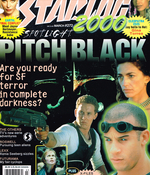
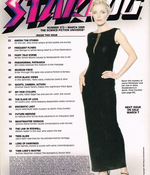
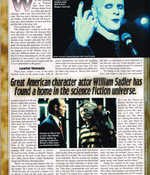
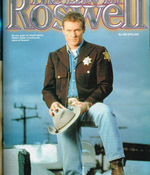
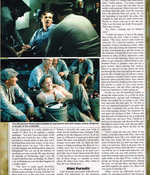
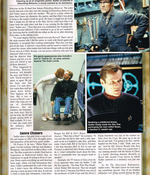 >
>